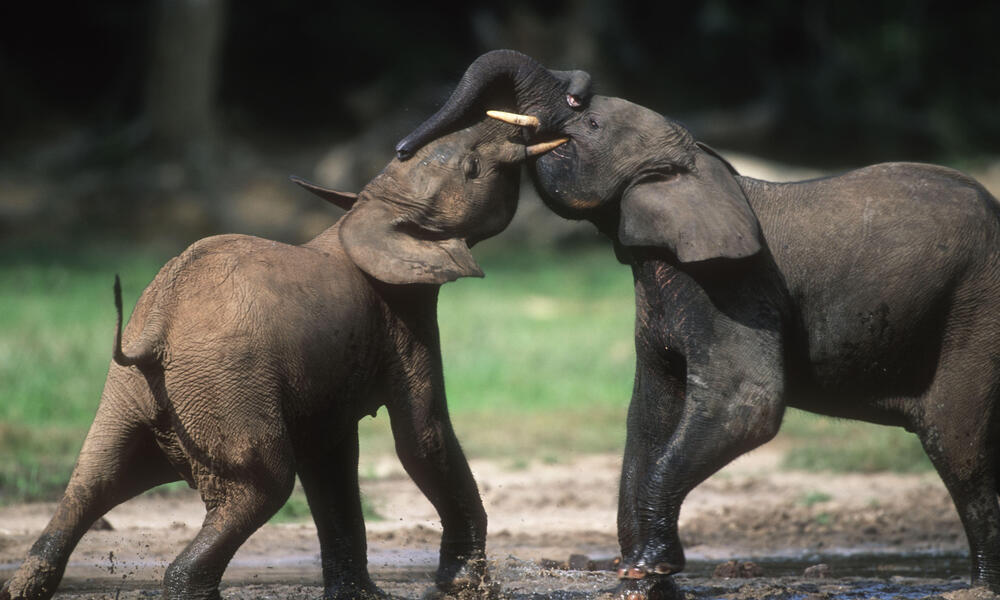5 things to know about the Congo Basin Rainforest
Posted on June, 22 2024
As 22 June marks World Rainforest Day, WWF stands as a committed partner and critical player uniting to ensure a better forest future for Africa – and celebrating Africa's iconic and invaluable Congo rainforest ecosystems and all who call the forest home.By Sue Northam-Ras
By Sue Northam-RasThe Congo Basin Forest: A vital ecosystem
The Congo Basin forest, spanning six Central African countries, is not just the largest tropical forest on the continent, but also the second-largest in the world. The Congo rainforest, covering a staggering 300 million hectares, is a unique and vital ecosystem, even when compared to the 800-million-hectare Amazon.
The six Congo Basin countries are Cameroon, the Central African Republic, the Democratic Republic of Congo, the Republic of Congo, Equatorial Guinea and Gabon.

Two decades of cross-border forest commitment
Twenty-five years ago, WWF-Cameroon took a visionary step by bringing together the 'forest countries' within the Congo Basin. In March 1999, for the first time on the African continent, presidents and leaders from the region gathered in Yaoundé, the capital of Cameroon, to reflect on the protection of the Congo forests. This historic event, known as the Yaoundé Forest Summit, was a turning point in the region's conservation efforts.
This summit resulted in a commitment to cross-border cooperation, new forest protected areas, transboundary parks, and safeguarding endangered wildlife and the people who rely on these healthy forests.
Three global tropical forests represented at a 2023 summit in Africa
Across the world, three major regions – the Amazon, the Congo and the Borneo-Mekong-South-East-Asia basins – collectively account for 80% of the world's remaining tropical forests. Together, they are also home to two-thirds of terrestrial biodiversity.
In October 2023, held in Brazzaville in the Republic of Congo, the second summit of the three basins – the Three Basins Summit – brought together leaders from the three most prominent global rainforest regions to form a global coalition.
Why? Because preserving biodiversity and tropical forests is crucial in the face of climate change. These forests, including the Congo Basin rainforest, play an essential role in regulating the carbon balance, absorbing and storing large amounts of carbon dioxide, a major greenhouse gas.
Five iconic forest species found in Africa's biggest rainforest
Amongst many smaller species, there are significant populations of forest elephants, as well as the awe-inspiring great apes – bonobos, gorillas and chimpanzees – and leopards. These are the charismatic and iconic species that many people imagine when they think about Africa's great forests along the equator.

Forward-looking solutions towards ensuring Africa's rainforests remain intact
While there are logging concessions in the Congo forest, there are also illegal logging operations and looming threats of conversion for agriculture, mining and infrastructure development. Using AI technology, Forest Foresight is an innovative early warning system used in Gabon that can predict illegal deforestation up to six months before it occurs. This allows authorities of the Congo forests to plan and ensure sustainable forest management. This innovative technology approach is jointly implemented by the Cameroon Ministry of Forests and Wildlife (MINFOF), the Gabon Ministry of Water and Forest Affairs, and other partners and was presented by WWF Gabon at COP28, the global climate meeting in 2023.
Across Africa, WWF country offices support various transboundary conservation landscapes and national parks, such Lobeke, Nki and Boumba Bek National Parks in Cameroon, the Dzanga Sangha Protected Areas in the CAR, Salonga National Park in DRC and the Nouabalé-Ndoki National Park in the Republic of Congo. WWF negotiates access rights for indigenous people and local communities to natural resources and also providing training for government eco-guards on human rights. There are successful "biomonitoring" projects – using simple camera set-ups – to record the diversity of life in the dense, often inaccessible rainforests of Central Africa.
If action isn't taken with urgency, the Congo Basin rainforest could become the next Amazon – a story of relentless deforestation, unknown and unrecorded species lost, and many forest people's lives and local livelihoods affected.
What role can you play in this crucial mission? Your individual actions can make a significant difference. By raising awareness, supporting conservation initiatives, and making sustainable choices in your daily life, you can contribute to the preservation of the Congo Basin rainforest and its invaluable biodiversity.
One way to raise awareness is by engaging with compelling stories that highlight the importance of these ecosystems. Watch Ikouah: Into the Heart of Cameroon's Rainforest, a captivating short film by filmmaker Jack Dunn that transports viewers to southeastern Cameroon. This 12-minute documentary follows the inspiring journey of Assamesa Laurent, a committed community member and bio-monitoring assistant. Through his eyes, we explore the rich biodiversity and stunning beauty of the rainforest surrounding his home. In this film, we discover the importance of protecting this vital ecosystem and meet the village chief and an eco-guard with different views on how best to go about it.
By sharing such stories and supporting conservation efforts, we can help ensure that Africa's rainforests remain vibrant and intact for future generations.

